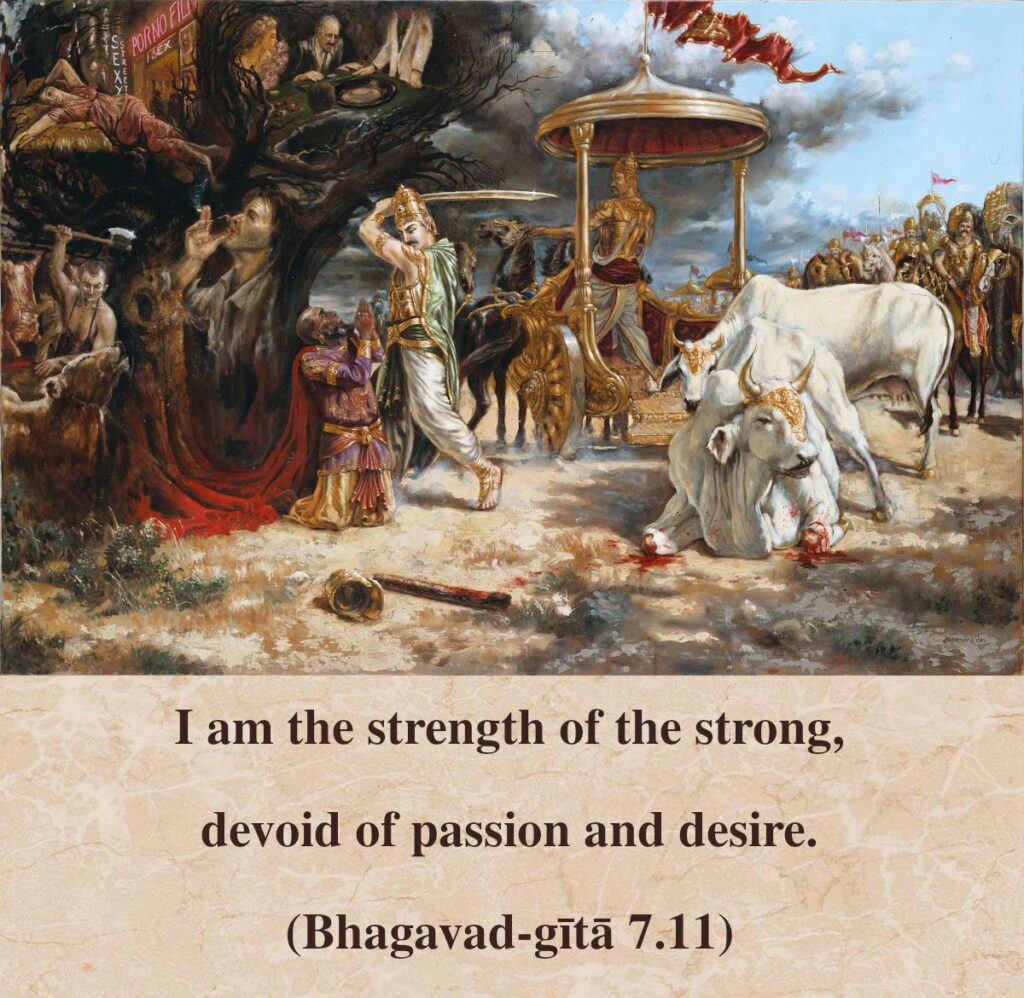बलं बलवतां चाहं कामरागविवर्जितम् |
धर्माविरुद्धो भूतेषु कामोऽस्मि भरतर्षभ || 11||
balaṁ balavatāṁ chāhaṁ kāma-rāga-vivarjitam
dharmāviruddho bhūteṣhu kāmo ’smi bharatarṣhabha
balam—strength; bala-vatām—of the strong; cha—and; aham—I; kāma—desire; rāga—passion; vivarjitam—devoid of; dharma-aviruddhaḥ—not conflicting with dharma; bhūteṣhu—in all beings; kāmaḥ—sexual activity; asmi—(I) am; bharata-ṛiṣhabha—Arjun, the best of the Bharats
Translation:
I am the strength of the strong, free from longing and attachment. I am, Ο lord of the Bhāratas, the desire in all beings that is not contrary to dharma.
Commentary:
Strength is the glory of man, but it should be free from desire and passion. Strength should not be abused to satisfy sensual desires and greedy acquisition of worldly possessions. It should be expressed in doing good and benevolent acts, in the worship of the Divine, and in the pursuit of spiritual illumination. Whether it is intellectual or physical strength, if it is employed for selfish purposes to serve the lower impulses, it is wretched. In such cases, it is only demonical might, an asuric force, leading to self-destruction. The might of Ravana was impure by Kama, and it lead to his destruction and that of his people. So purity in strength, nobility in might, is what the Lord wants people to cultivate. His presence is felt in such strength.
The Lord is also ‘desire’ (kama) unopposed to Dharma. The desire to maintain one’s family in a good condition, to live in society without becoming a burden on others, to relieve the suffering of others – such desire, though it is kama, is the divine aspect of the Lord. There is no evil in such desire.
There are three distinct stages in the development of man. In the first stage, man’s desires instinctively run after sense-enjoyments and the gratification of lust and greed. In the second stage, desire becomes ennobled to the higher plane of selfless acts of service, generosity, and benevolence. It is then purified of its former evil. In the third and last stage, desires disappear from the mind when man realises the true Self. Then there are no desires, good or bad. It is true that Self realisation is not possible without giving up all desires. But man’s development is traceable from bad to good, and from good to the free state of Moksha. Here the Lord speaks of the second stage. Desires which agree with the Sastras, which do not run counter to Dharma, produce no evil effects. Gradually, man should rise to the ‘nirvikalpa‘ state of mind. Give up bad desires, and then give up all desires, and be thoroughly contented in the Self. This is the significance of the Lord’s statement here.
Bhagavad Gita: Chapter 7 🔻 (30 Verses)
